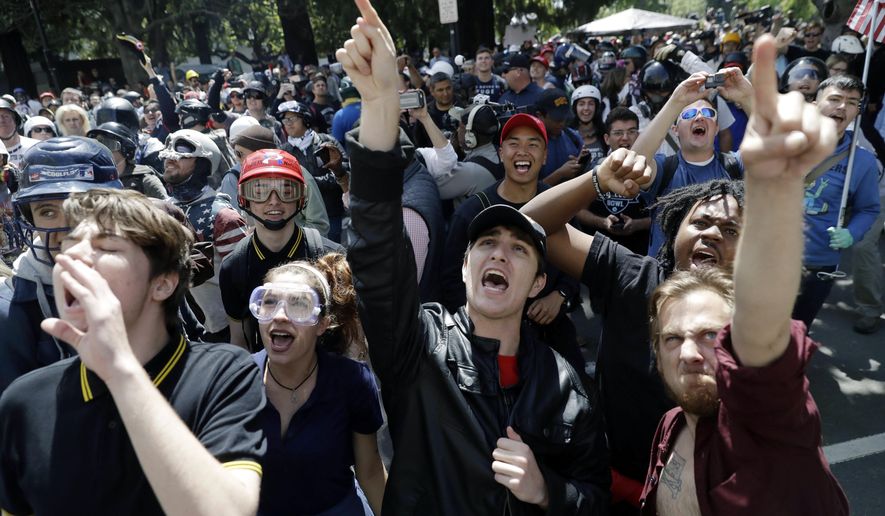An admissions letter from Harvard University was once considered cause for celebration, but in conservative households, that may be changing.
David M. Whalen, provost of Hillsdale College, a school with a conservative reputation, said he has noticed an uptick in the number of parents who send their children to Hillsdale to avoid colleges where conservative thought is met with ridicule, suppression and violence.
“The educational environment has become so distempered that, in many cases, parents are now looking elsewhere,” Mr. Whalen said. “In fact, more and more parents tell us at Hillsdale that they had assumed their children would go to this or that institution, but they are deeply grateful to find Hillsdale instead.”
A survey released this week by the Washington-based Pew Research Center shows Republicans have never been more down on higher education.
Just 36 percent say the institution has a positive effect on the nation, compared with 58 percent who say it has a negative effect. Those numbers were almost reversed two years ago, when 54 percent of Republicans said higher education had a beneficial effect on the nation, compared with 37 percent who said it had a harmful effect.
Bookending those two years were massive student demonstrations that shut down the University of Missouri and Evergreen State College in Washington, with countless conservative speakers disinvited, protested or shouted down on seemingly every other campus in between.
In February, protesters clad in black masks and armed with poles, fireworks and bricks set fires and smashed windows at the University of California, Berkeley, to preempt a scheduled lecture by conservative provocateur Milo Yiannopoulos.
“Higher education has been progressively radicalizing for a long time, but recent events have brought the extent of it into high relief,” Mr. Whalen said. “It’s virtually beyond parody. Campus violence, suppression of speech and intellectual inquiry, and the rather haughty presumption of moral superiority undercut confidence that much of real value is going on there.”
The Pew study, which surveyed 2,504 adults from June 8 to 18 and has an error margin of 2.3 percentage points, also showed Republican opinion of higher education nose-diving among the party’s more conservative members.
Sixty-five percent of self-identified conservatives say the institution has a negative effect on the nation, compared with 29 percent who say it has a positive effect.
Of the five major institutions measured by Pew — churches, banks and financial institutions, labor unions, the national news media, and institutions of higher education — only the media were viewed more negatively by Republicans than academia.
Younger Republicans tend to view universities more favorably, but opinion about higher education is down dramatically among all age groups.
Forty-four percent of Republicans ages 18 to 49 said higher education has a positive effect on the nation, down 21 points since 2015. Just 28 percent of Republicans older than 50 said academia is beneficial to society, down 15 points since 2015.
Seventy-two percent of Democrats said colleges and universities have a positive effect on the nation, up from 65 percent in 2010.
Michael Poliakoff, president of the American Council of Trustees and Alumni, a higher education think tank based in Washington, said opinions about academia do not fall neatly along party lines.
“Perceptive thinkers of both parties have expressed very legitimate concerns about graduates who do not have appreciable respect for the First Amendment and are unable to rationally engage with social and political views other than their own,” Mr. Poliakoff said. “Likewise, look at the issue of cost and outcomes. Employers and advocacy organizations across the political spectrum have sharpened their focus on higher education’s return on investment.”
He said thinking about the problems facing higher education in partisan terms is a “missed opportunity to talk about badly needed reforms” with bipartisan support.
If Republican views toward higher education continue to sour, Mr. Whalen said, then the ramifications could be significant.
“I expect the consequences of all this will be many and far-reaching,” he said. “Legislatures will restrict funding, endowments will be regulated, disciplines known for being radicalized will be taken less and less seriously while the flight to nonideological fields of study will increase, the attention paid to so-called experts in academia will continue to slide and the academic bubble will grow increasingly unreal.”
Case in point: In response to the Evergreen protests, Republican lawmakers in Washington proposed a bill to strip the school of its taxpayer funding.
“This is all tragic, really,” Mr. Whalen said, “as a genuinely noble activity is making itself an object of disdain.”
• Bradford Richardson can be reached at brichardson@washingtontimes.com.




Please read our comment policy before commenting.